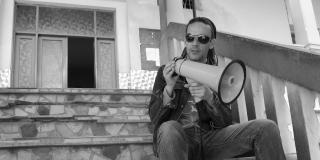
Darren Clark has dedicated 12 years to harnessing the power of music to educate communities in Southern Africa on HIV and AIDS. Darren, now with an MBE to his name, says the fight against HIV and AIDS is not over.
“Music is something primal, something deep. Everyone has a song that can make them feel energetic, or angry, or put them in a beautiful, happy space.”
While volunteering in Mozambique, Darren found out just how powerful music can be. Now he's been named in the Queen's Birthday honours list, and is set to receive an MBE, awarded by the Queen, in recognition of the positive impact he has made.
It all started while Darren was a VSO volunteer in Mozambique, in 2004. Darren, who had been working as a teacher, befriended some musicians who, one weekend, stumbled upon a way of talking to young people about their HIV status.
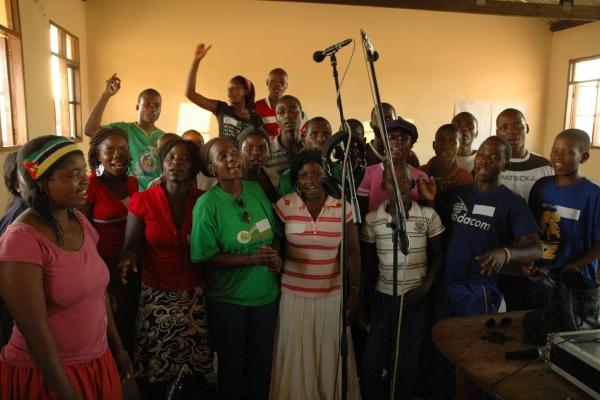
"Some musician friends visited a small village to talk about HIV testing. They started jamming with the crowd and asked the audience why they were afraid to test for HIV. They ended up creating a song about HIV,” said Darren.
“The next day, the doctor had a queue outside his clinic of people singing the song and coming to get tested for HIV.”
Darren realised they were onto something. In Mozambique, there are an estimated 1.8 million people living with HIV, and those with the virus are heavily stigmatised.
With VSO’s support, Darren began organising concerts in communities. However, he had no idea of the challenges he would be up against.
What does a world without AIDS look like?
Darren and his crew of musicians, who came together to form an organisation called Positivo, began to run workshops with students. Darren, who had been working as a VSO volunteer, was given the freedom to pursue this project, with VSO funding his time in Mozambique.
The workshops started with students completing an anonymous form, recording their beliefs and misconceptions around sex.
The musicians then worked with the young people to create and record a song, using ideas generated by the students. At the core of Positivo was a message of positivity.
Finally, a health professional from the local community answered questions, addressing myths around HIV, like ‘you can’t get HIV if you have sex underwater’.
This gave many young people the courage to visit their local clinic for advice for the first time.
“We knew once our project had finished, if any of the students had questions about their sexual health, they would have to go to that health worker,” said Darren.
“At the end of the workshop, often the young people would say, ‘I was too frightened to go to the clinic to get contraceptives before, but now I feel confident enough visit them for advice in the future.’”
Uncovering abuse
Through anonymous forms, Positivo were given an insight into what was happening behind closed doors in the communities they visited.
In one school, Darren discovered teachers abusing their positions of power.
“A sixteen-year-old girl started speaking about how it was commonplace for students and teachers to sleep together if a girl failed the year. It had been normalised.
“Then the students created a song with a really strong message to potential sexual predators, asking adults and youth to denounce sexual abuse.
“It was an incredible turnaround in just one week.”
In another community, Darren found it was common practice for girls as young as seven to be taken into the hillside to be raped by older men. Here, however, they ran into trouble when they tried to raise their concerns with community leaders.
“The local government officials told us that the data was incorrect. They wanted us to redo the questionnaires and ask different questions. But the facts were clear.”
Darren says the officials did their best to shut down the project, but he was undeterred, going on the radio to broadcast his findings and the song the students had created.
“Music is something primal”
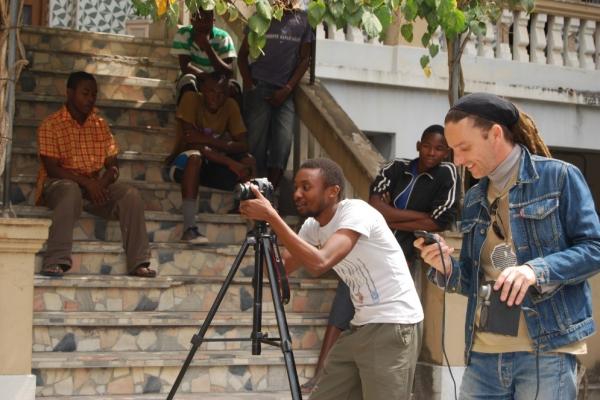
Shooting a pop video in Inhambane, Mozambique.
Discovering this abuse only made Darren and the Positivo team more determined to root out abuse, and music proved the perfect medium to do so.
“The start of the Portuguese revolution came with a song being played on the radio. Music is something primal, something deep.
“Music gets itself into the human spirit and creates connections. Everyone has memories of feeling euphoric or together with people and there's always music accompanying those moments. Through song we are able to break taboos and tackle difficult issues.
“Young people come together around music, so if you can use that medium to educate people on sexual health, it becomes an incredibly valuable tool for creating behaviour change."
“This becomes even more powerful when the people whose behaviour you are trying to influence are the people creating the message.”
Once a song had been created, the students performed the song to the whole community and recorded it to be played on the radio. Sometimes, they would film a music video to accompany the song – meaning the message of positivity was spread even wider.
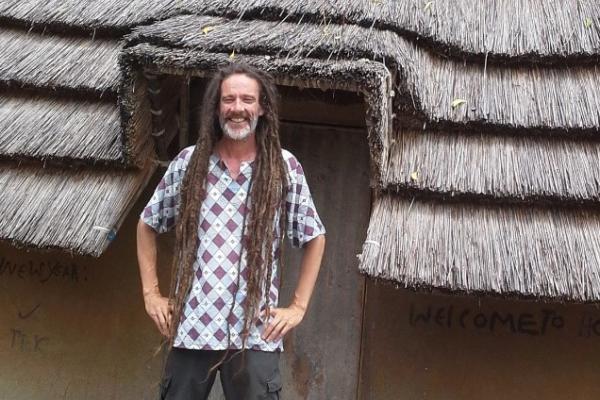
Not over
After over a decade educating people on HIV and AIDS, Darren has now refocused his efforts, working in South Sudan in conflict resolution with Nonviolent Peaceforce.
However, Positivo lives on: in 2013, VSO supported Darren to expand Positivo’s work to Malawi in addition to Mozambique, and Positivo continues to run musical workshops on HIV and AIDS in both countries.
Now, Darren is urging people to not give up on tackling HIV and AIDS.
“In the last month I've been seeing articles about HIV and AIDS in the Western press talking as though the battle is over with HIV.”
“We're still a long way, though, from everyone knowing their HIV status. It's not just a case of medication, we need massive efforts to educate people.
“Each generation deserves accurate information on HIV and AIDS.”
Read more
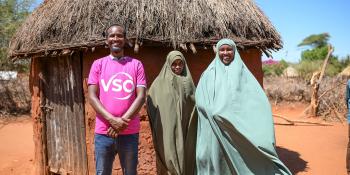
A ripple of change: how VSO volunteers are transforming communities
Every act of volunteering begins with a choice — a decision to act out of a desire to make a difference. Across the world, VSO volunteers are proving that one spark of action can ignite something much bigger.

The two volunteers empowering girls and young women in Mozambique
Nelma and Carmirene and are two volunteers working on VSO's EAGLE project in Mozambique. For Nelma and Carmirene, education is not just about school, it is about meeting people where they are and using the right tools to challenging harmful norms. Here are their stories.
Opening doors to safety, education, and a brighter future
For girls in Karamoja, the poorest region in Uganda, being forced into early motherhood is all too common. This Christmas, you can open the doors to Safety, Education, and a Brighter Future.
